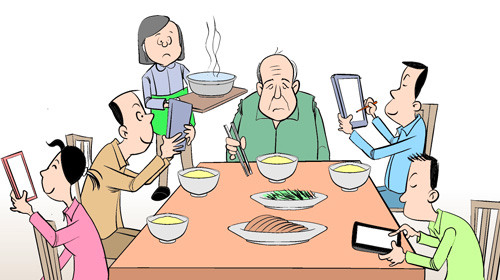Smartphones are intruding on people's lives at a much faster pace
It is getting more difficult to get up in the morning for Liu Juan, a freshman in Central China's Wuhan University. Liu received an iPhone 4S from her parents as her college admission gift in September and since then the phone has become an irreplaceable part of her life.
"I never thought this phone could occupy so much time in my life and it seems I cannot go a day without it now," said Liu, who added that almost everybody in her freshman class uses smartphones. "Besides avoiding the feeling of being isolated from the class, this phone is indeed really useful and convenient. It is like a portable laptop. Except for typing long articles, it can do almost everything that a laptop can do."
|
 |
Liu listed quite a few reasons to ground her statement: She can exchange messages with other iPhone users free of charge, check e-mails anytime no matter where she is, as well as take pictures and share them online instantly. As a person who has no sense of direction, the map installed in the smartphone is a great help.
"Smartphones are not just fashionable. They are necessary," Liu said.
Liu's three roommates all have smartphones. "Every night after we switch off the light in the dorm to go to bed, you can see four shining phone screens over the beds," Liu said. "Sometimes we share news. Sometimes we just keep silent and play."
Far reach
Statistics from the Ministry of Industry and Information Technology show that 172 million smartphones were sold in China from January to September this year, an increase of 183.4 percent compared to the same period in 2011.
It is commonplace for each person sitting in a subway or bus each to have a smartphone in hand, playing games or surfing the Internet.
Huang Zixian, a 33-year-old woman in Beijing, was once a victim of pickpocketing. "I realized what made me feel panic is the loss of the smartphone, not money," Huang said. "I don't mind spending money and time restoring my ID card and bank cards, but without the phone, I am really at a loss as to what to do next."
Pu Yu, another woman in Beijing, agreed with Huang. Pu once left her bag in a restaurant. "Thankfully, my phone was not in the bag! So, it didn't matter that much to me at all," Pu said.
A survey of college students in Wuhan, Hubei province, showed that 63 percent of the respondents spent time on smartphones at bedtime and 56 percent of them spent more than half an hour. They read novels, visited social networking sites, chatted or played games. Only 12 percent said that they kept from their phones at all at bedtime.
"It has already become a must-do thing. Without smartphones, I couldn't even fall asleep," said Meng Tingting, a student from Central China Normal University. "Some of my classmates even use them until 1 or 2 am every night."
Jian Xinke, a sophomore at Zhongnan University of Economics and Law in Wuhan, speaks highly of smartphones' role in relieving pressure. "We have a busy schedule during the daytime, and playing with phones before sleep is a way to relax."
